My Weekly Study Routine
Part 1 - The Liturgy
Mondays & Fridays
Early every Monday and Friday morning I have a two-hour standing appointment with this stack of books:
Be Thou My Vision, by Jonathan Gibson,
The Holy Bible, & a plain black journal.
This stack functions somewhat like bookends to my week—I start and finish with this mini-routine, and fill in gaps in the middle with other work.
In this first article, I’ll focus on Jonathan Gibson’s book, Be Thou My Vision, and how I use it as a resource throughout my study week.
Be Thou My Vision
Gibson’s book, Be Thou My Vision, is book of liturgy.
If you’re not familiar with the term, “liturgy” simply means “acts of worship.” While the term isn’t used as often as it once was—and may evoke thoughts of dry, stuffy readings in churches—liturgy is something you probably see every Sunday at church in some shape or form. In fact, if your Sunday morning church service has a call to worship, a time of prayer, a time of reading the Scriptures, a time of singing—these are all examples of liturgy.
This specific book written by Jonathan Gibson was designed to simply provide structure for our times of daily worship/set aside time with the Lord. Each day, the guide will move you through:
A call to worship
a praise of adoration
a reading of the law
portions of various creeds
assurance of the Lord’s pardon for His people
chapter readings of Scripture
portions of songs
catechisms
and various prayers (confession, thanks, asking God to illuminate His Word as you study, prayer over personal matters, prayer over your church, & prayers for the world)
Here is a snapshot of one day:
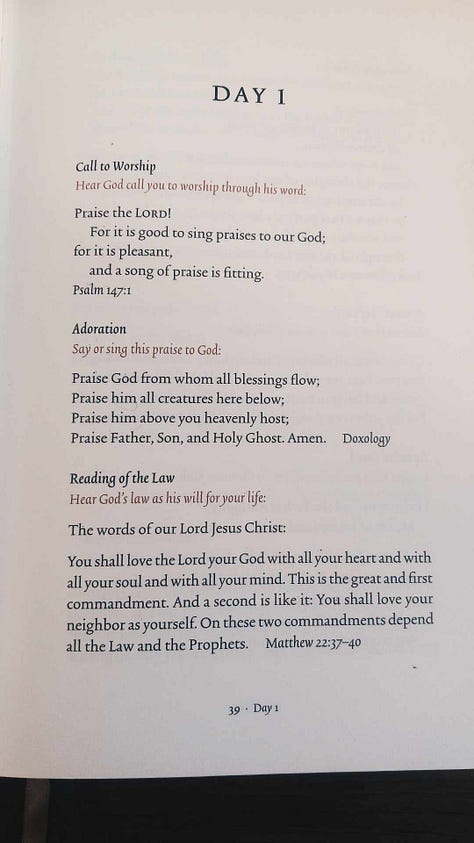
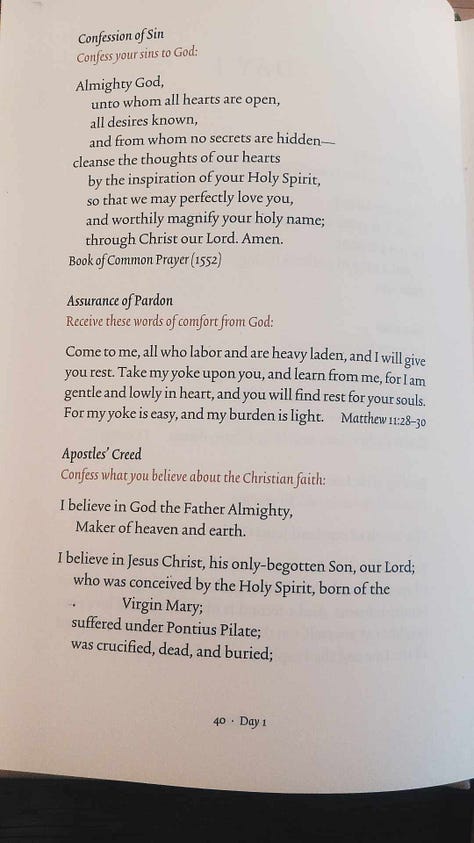
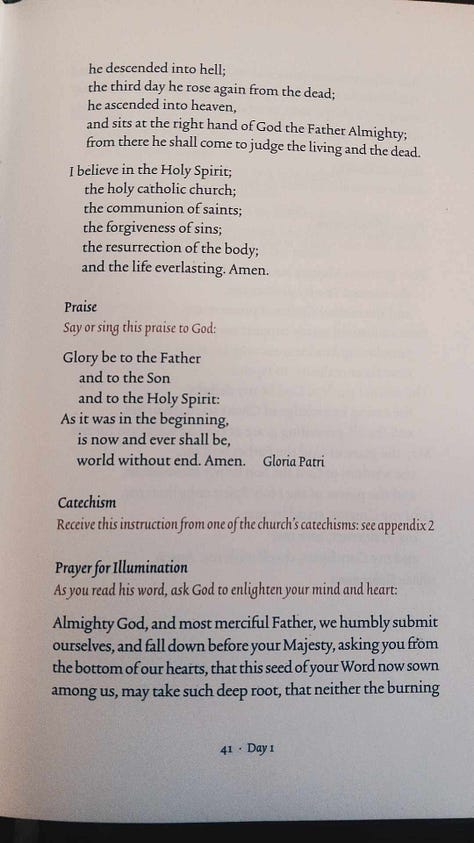
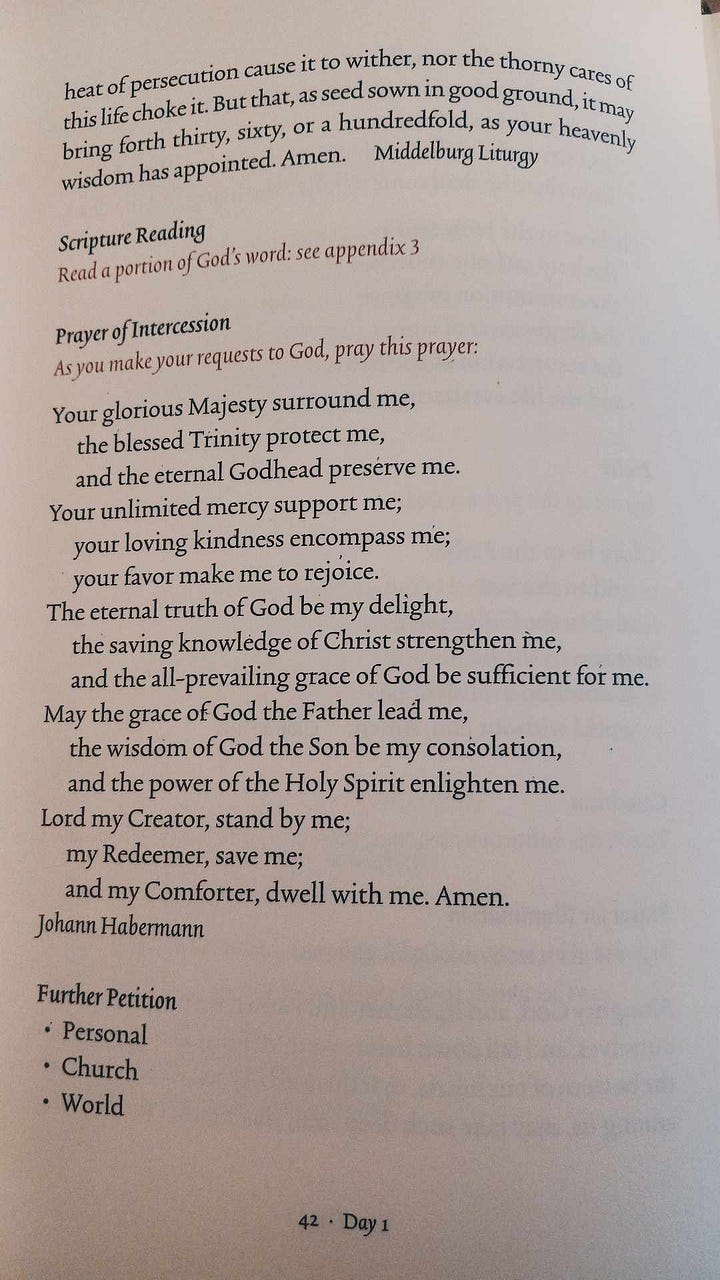
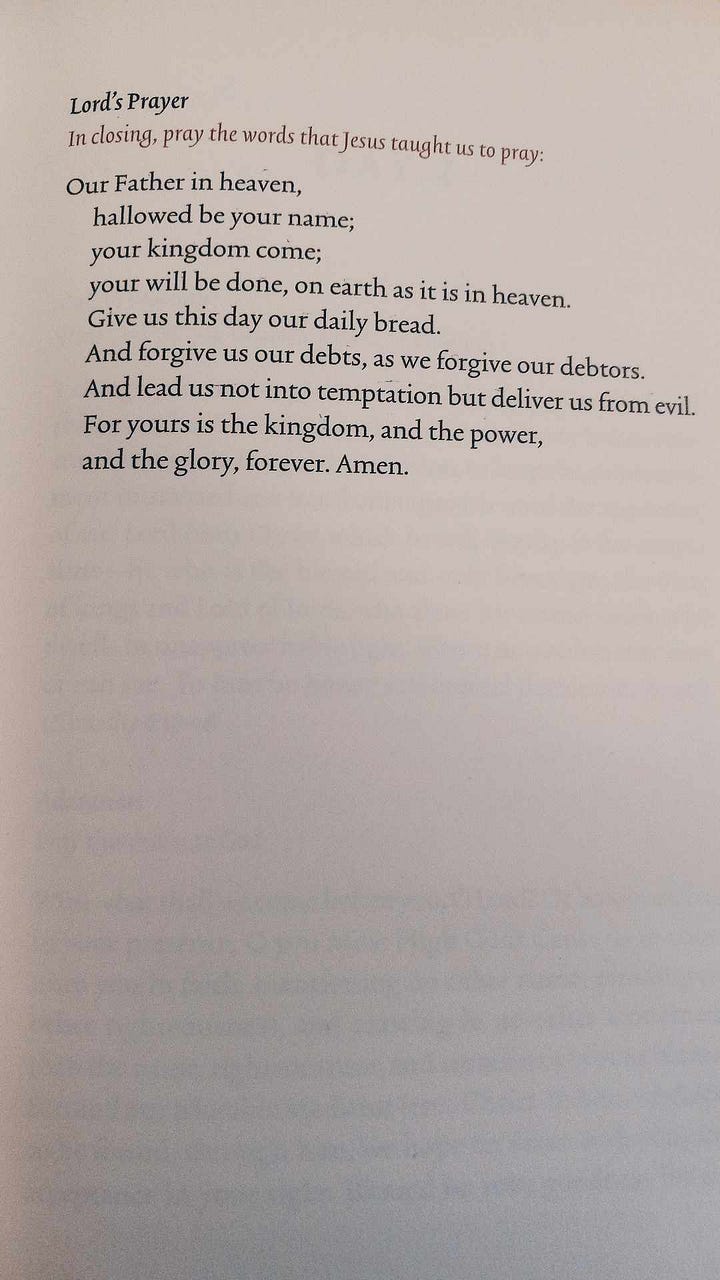
As you glance over those words, there are a number of knee-jerk reactions you may have. Some of the prayers and writings are Puritan writings. Many of the short songs will be ancient, unfamiliar. You may not have spent a lot of time in creeds or catechisms before; you may not be sure what creeds or catechisms are.
But here is what I can tell you:
First,
while many of these collected writings are “old,” and their language may seem outdated, they are packed with theological gold. They can take some getting used to, but we’d be hard-pressed to find richer writings than those of the Puritans and other older, faithful theologians featured in this little book.
Second,
It is so, so, good to move a heart through this process every day.
.
.
It is good to open up to a call to worship before your life starts on a Monday morning. To rise before the wave of to-do’s and concerns and appointments begin, and say out loud to your God,
“Praise the LORD! For it is good to sing praises to our God; for it is pleasant, and a song of praise is fitting.” (Psalm 147:1)
For me, everything else stops in that moment and has to bend the knee. Oh that’s right. Jesus is King. This is all about Him. I always have to pause then, take a breath, look outside at the sky, and reorient myself.
The world that was rushing around me, rushing me forward, moving me along and pulling me ten different directions loses its hold for a time, and my heart stills before my Maker. It’s a centering that happens, of my soul.
From the call to worship you will move to a praise of adoration,
and then you will read some bit of the law from Scripture—maybe from Matthew, maybe from Deuteronomy, maybe John. It will be different each day, but it will be God’s Words plain as day—His law and will for your life.
“Our Lord said,
As the Father has loved me, so have I loved you. Abide in my love. If you keep my commandments, you will abide in my love, just as I have kept my Father’s commandments and abide in his love. These things I have spoken to you, that my joy may be in you, and that your joy may be full. This is my commandment, that you love one another as I have loved you.” (John 15:9-12)
As we know, the word of God is living and active, sharper than any two-edged sword, piercing to the division of soul and of spirit, of joints and of marrow (Hebrews 4:12), so who knows how the Holy Spirit will use those words from the law in your life that day? Who knows what it will cut through?
This, day after day—some reading of the law to measure your life and heart against—
is a healthy practice for the soul.
After a reading from the law, Gibson rightly moves us to a prayer of confession each day. It’s a natural and fitting progression, because after we hear God’s law, we should immediately sense in our Spirit all the ways we do not add up. Any time we measure ourselves up against the law, we will come up short.
This should always lead to a time of confession.
Imagine getting this off your chest before your day begins:
“I, a poor sinner, confess before you, my God and Creator, that I have sinned gravely and in various ways against you, not only with outward gross sins, but much more with internal, innate blindness, unbelief, doubts, faintheartedness, impatience, pride, evil greed, secret envy, hatred and jealousy, as well as other evil emotions. You, my Lord and God, recognize this in me very well, but sadly I cannot recognize them sufficiently. I feel sorrow and regret for them and wholeheartedly desire grace through your dear Son Jesus Christ. Amen.”
That’s a prayer written by Zacharius Ursinus and you’ll find it on Day 31, pg 232 of this book of liturgy.
As I read through the daily portion of the law from Scripture, and I read aloud the prayer of confession, my conscience gets heavier and heavier. The confessions of Zacharius Ursinus or Martin Bucer, or whoever the author may be that day,
suddenly have invisible empty boxes beside them, and I sense the Holy Spirit checking them off one by one in my heart. Guilty.
I’m dust, I’m dirt, I’m wretched, and my sins are many.
It’s for this reason it’s such a sweet relief that our liturgy moves next to the “Assurance of Pardon” section. Here we are assured by God’s Word that, while it’s true our sins are many—He has pardoned them all completely.
“Receive these words of comfort from God,” Gibson writes.
“Come now, let us reason together, says the LORD:
though your sins are like scarlet,
they shall be white as snow;
though they are red like crimson,
they shall become like wool.” (Isaiah 1:18)
And at these words, I always think of that old hymn that said
“at the cross, at the cross, where I first saw the light
and the burden of my heart rolled away…”.
It feels like that, to go from reading a heavy, impossible law, to hearing that your scarlet sins have been made white as snow. It’s a burden lifted, and that guilt and shame are replaced with joy, freedom, and gratitude.
It’s always with a light and happy heart I move on to the next section of the liturgy.
So all this already for the soul, and yet when you’ve come this far, you’re still only halfway through your daily liturgy. There’s still so much more lying ahead that will bless you and help fix your eyes on Jesus for the day.
So far we’ve gone from worship & adoration, to the law, to confession, to assurance of pardon. Still ahead we have the creeds & catechism, prayer for illumination as we read the Scripture, then an actual assignment of Scripture reading, and several helpful types of prayer to close out our time.
It can take as little as fifteen, twenty minutes to get through this simple guide, but it can truly, truly, be so impactful.
For more of my thoughts on this liturgy book as a component of study & worship time throughout the week, be looking for “My Weekly Study Routine - Part 2” as a next Substack.
While the second half of this liturgical guide takes me into some of the most important parts of my study week, it’s a lot to fit into one article, so I broke it up for easier consumption.
.
.
In addition to this liturgy book, there are several other components I include in my Weekly Study Routine. I’ll be sharing posts on those as well if anyone is interested, including the book of the Bible I’m slow-studying right now, my journaling habits, the theology books I’m using, as well as other resources.
Request for Regular Readers*
I don’t usually ask for comments on Substack—but can you let me know: Does this topic interest you?
I enjoy sharing things I’m studying and what’s helping me, but I’d love to hear if this is valuable for those I’m writing regularly for.
Thanks in advance ❤️


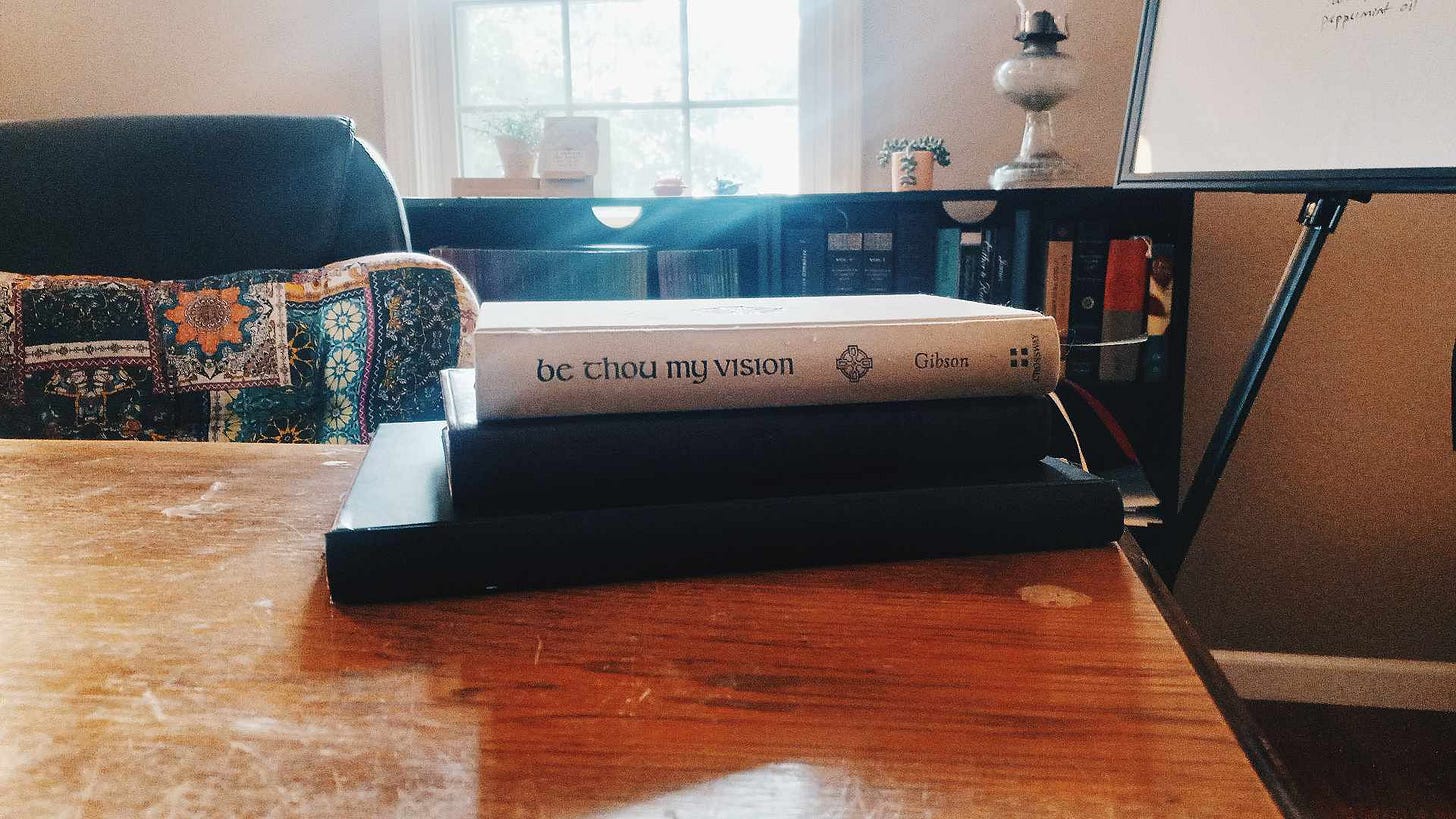
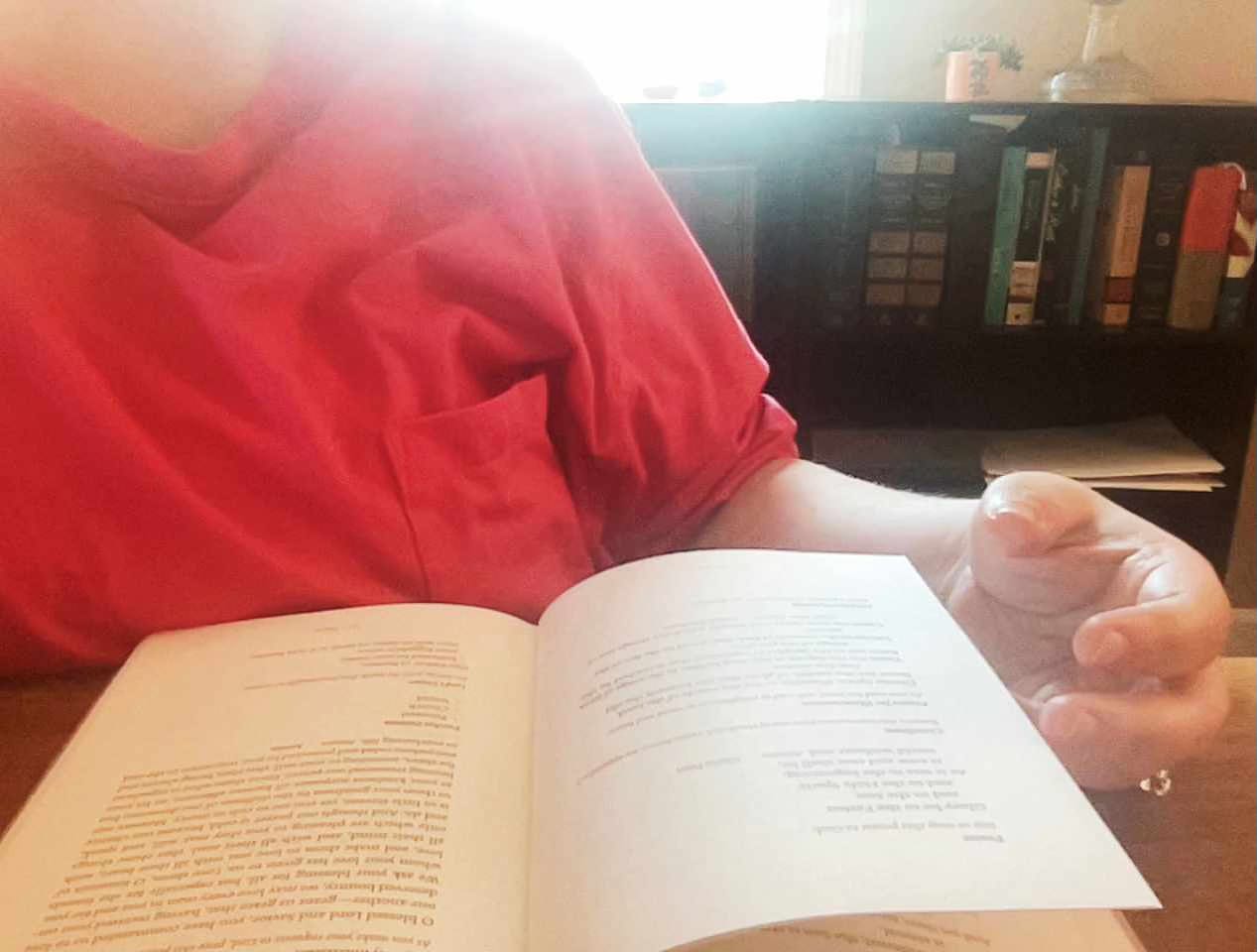
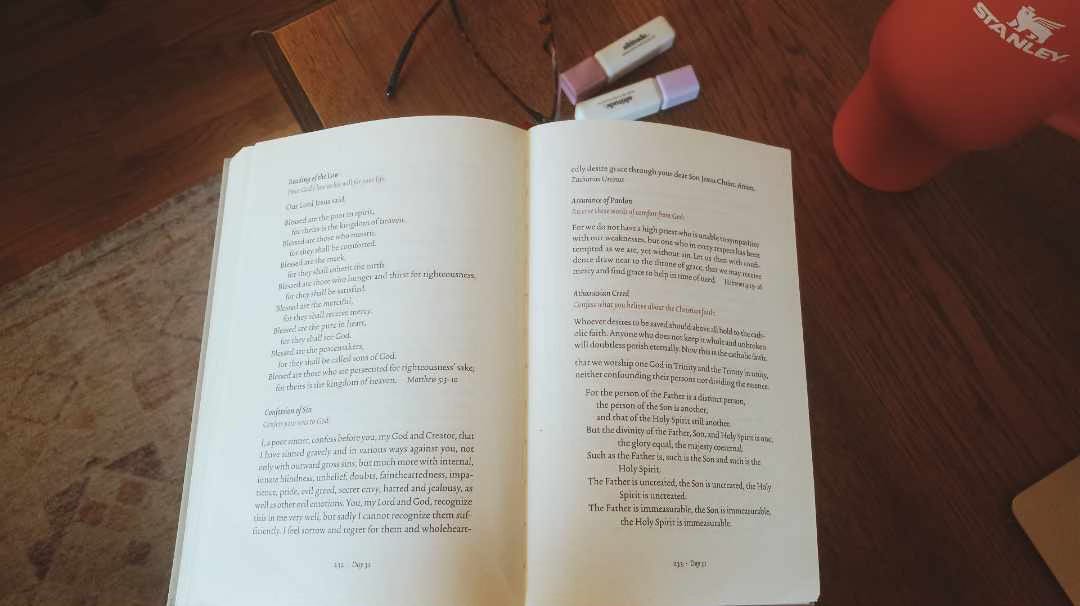

Yes! I like this and want more ☺️❤️
So inspiring as always! Love the liturgy explanation. I honestly never knew what it meant. Love ya! Mom:)